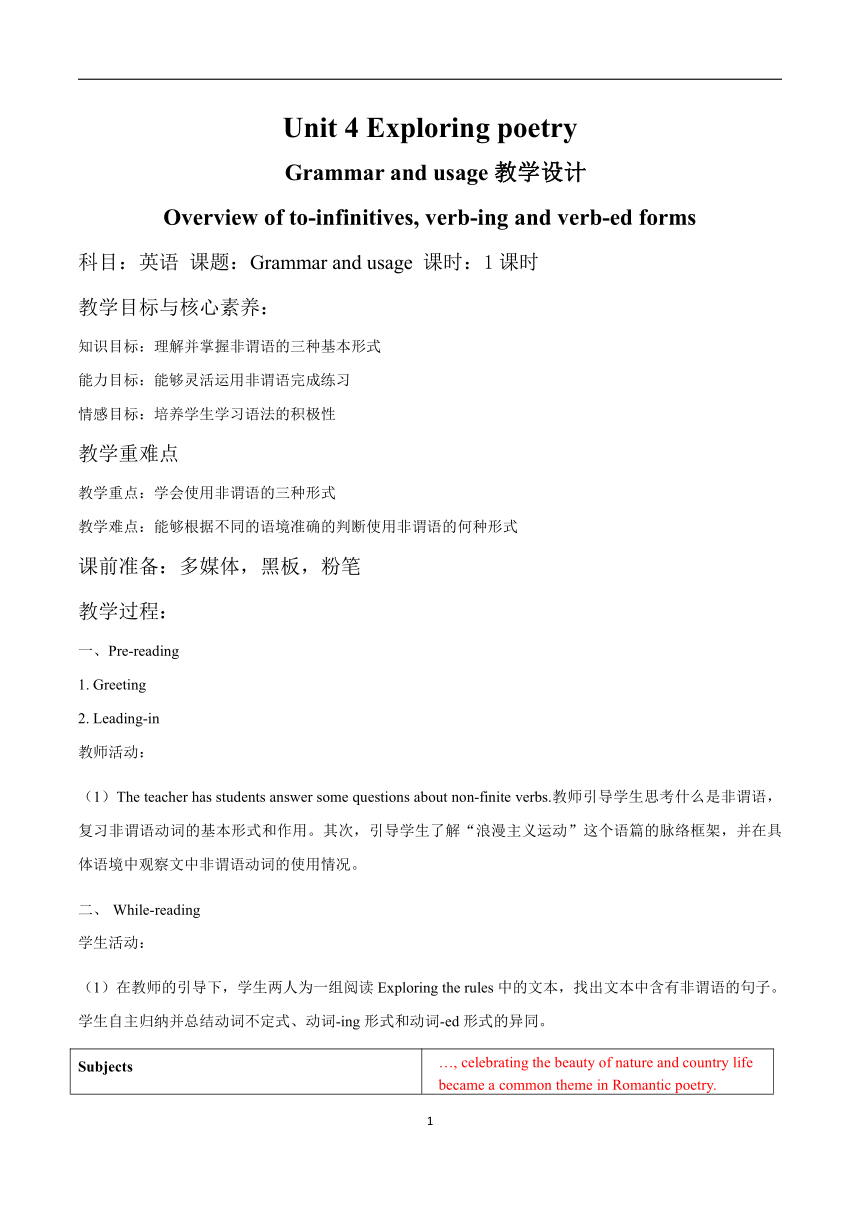牛津译林版(2019)选择性必修第一册Unit 4 Exploring poetry Section B Grammar and usage 教案
文档属性
| 名称 | 牛津译林版(2019)选择性必修第一册Unit 4 Exploring poetry Section B Grammar and usage 教案 |  | |
| 格式 | docx | ||
| 文件大小 | 37.4KB | ||
| 资源类型 | 教案 | ||
| 版本资源 | 牛津译林版(2019) | ||
| 科目 | 英语 | ||
| 更新时间 | 2022-10-24 12:14:46 | ||
图片预览

文档简介
Unit 4 Exploring poetry
Grammar and usage教学设计
Overview of to-infinitives, verb-ing and verb-ed forms
科目:英语 课题:Grammar and usage 课时:1课时
教学目标与核心素养:
知识目标:理解并掌握非谓语的三种基本形式
能力目标:能够灵活运用非谓语完成练习
情感目标:培养学生学习语法的积极性
教学重难点
教学重点:学会使用非谓语的三种形式
教学难点:能够根据不同的语境准确的判断使用非谓语的何种形式
课前准备:多媒体,黑板,粉笔
教学过程:
一、Pre-reading
1. Greeting
2. Leading-in
教师活动:
(1)The teacher has students answer some questions about non-finite verbs.教师引导学生思考什么是非谓语,复习非谓语动词的基本形式和作用。其次,引导学生了解“浪漫主义运动”这个语篇的脉络框架,并在具体语境中观察文中非谓语动词的使用情况。
While-reading
学生活动:
(1)在教师的引导下,学生两人为一组阅读Exploring the rules中的文本,找出文本中含有非谓语的句子。学生自主归纳并总结动词不定式、动词-ing形式和动词-ed形式的异同。
Subjects Predicatives
Objects
Complements
Attributives
Adverbials
(2)学生完成 working out the rules 的练习。师生核对练习的答案。
The to-infinitive often refers to an action that will happen in the future; the verb-ing form, a continuing action; and the verb-ed form, a past action.
Generally speaking, the verb-ing form expresses a(n) (1) ________ (active/passive) meaning, while the verb-ed form expresses a(n) (2) ________ (active/passive) meaning.
The to-infinitive can be used as the (3) ____________ of a sentence. (abcdef)
The verb-ing form can be used as the (4) ____________ of a sentence. (abcdef)
The verb-ed form can be used as the (5) ________ of a sentence. (bdef)
*You can choose more than one answer for each blank.
a. subject b. predicative c. object
d. complement e. attributive f. adverbial
教师活动:
(3)教师引导学生浏览课本95-97页关于非谓语的知识点,帮助学生理解,归纳,总结。
三、After-reading
1. 学生活动:Students finish B1 Page 49.
interested in experimenting with new poetic forms; describing natural scenes; focusing on nature; Filled with descriptions of magic and ancient themes; to find concerns common to all of them.
2. 学生活动:Students finish B2 on Page 49.
leading; growing; educated; touring; Meeting; written; to express; living/ to live
3. 学生活动:Students finish B3 on Page 49.
Reading poems helps develop deep insight into what the poet wants to express. Every poem is unique to its poet and its message might first need to be discovered before it can be understood. A poem also represents what the poet was experiencing at that time, such as passion or sorrow. When I read a poem, I want to discover and understand the poet’s message. So I often think about what the poet was going through at that time. Understanding the poet’s thoughts and feelings opens up a whole new world for me and keeps me from getting bored.
四、Summary
归纳总结非谓语的用法
五、作业布置
掌握95-97页知识点。
2
Grammar and usage教学设计
Overview of to-infinitives, verb-ing and verb-ed forms
科目:英语 课题:Grammar and usage 课时:1课时
教学目标与核心素养:
知识目标:理解并掌握非谓语的三种基本形式
能力目标:能够灵活运用非谓语完成练习
情感目标:培养学生学习语法的积极性
教学重难点
教学重点:学会使用非谓语的三种形式
教学难点:能够根据不同的语境准确的判断使用非谓语的何种形式
课前准备:多媒体,黑板,粉笔
教学过程:
一、Pre-reading
1. Greeting
2. Leading-in
教师活动:
(1)The teacher has students answer some questions about non-finite verbs.教师引导学生思考什么是非谓语,复习非谓语动词的基本形式和作用。其次,引导学生了解“浪漫主义运动”这个语篇的脉络框架,并在具体语境中观察文中非谓语动词的使用情况。
While-reading
学生活动:
(1)在教师的引导下,学生两人为一组阅读Exploring the rules中的文本,找出文本中含有非谓语的句子。学生自主归纳并总结动词不定式、动词-ing形式和动词-ed形式的异同。
Subjects Predicatives
Objects
Complements
Attributives
Adverbials
(2)学生完成 working out the rules 的练习。师生核对练习的答案。
The to-infinitive often refers to an action that will happen in the future; the verb-ing form, a continuing action; and the verb-ed form, a past action.
Generally speaking, the verb-ing form expresses a(n) (1) ________ (active/passive) meaning, while the verb-ed form expresses a(n) (2) ________ (active/passive) meaning.
The to-infinitive can be used as the (3) ____________ of a sentence. (abcdef)
The verb-ing form can be used as the (4) ____________ of a sentence. (abcdef)
The verb-ed form can be used as the (5) ________ of a sentence. (bdef)
*You can choose more than one answer for each blank.
a. subject b. predicative c. object
d. complement e. attributive f. adverbial
教师活动:
(3)教师引导学生浏览课本95-97页关于非谓语的知识点,帮助学生理解,归纳,总结。
三、After-reading
1. 学生活动:Students finish B1 Page 49.
interested in experimenting with new poetic forms; describing natural scenes; focusing on nature; Filled with descriptions of magic and ancient themes; to find concerns common to all of them.
2. 学生活动:Students finish B2 on Page 49.
leading; growing; educated; touring; Meeting; written; to express; living/ to live
3. 学生活动:Students finish B3 on Page 49.
Reading poems helps develop deep insight into what the poet wants to express. Every poem is unique to its poet and its message might first need to be discovered before it can be understood. A poem also represents what the poet was experiencing at that time, such as passion or sorrow. When I read a poem, I want to discover and understand the poet’s message. So I often think about what the poet was going through at that time. Understanding the poet’s thoughts and feelings opens up a whole new world for me and keeps me from getting bored.
四、Summary
归纳总结非谓语的用法
五、作业布置
掌握95-97页知识点。
2
同课章节目录
- Unit 1 Food matters
- Welcome to the unit
- Reading
- Grammar and usage
- Integrated skills
- Extended reading
- Project
- Unit 2 The Universal Language
- Welcome to the unit
- Reading
- Grammar and usage
- Integrated skills
- Extended reading
- Project
- Unit 3 The art of painting
- Welcome to the unit
- Reading
- Grammar and usage
- Integrated skills
- Extended reading
- Project
- Unit 4 Exploring poetry
- Welcome to the unit
- Reading
- Grammar and usage
- Integrated skills
- Extended reading
- Project
